Visit Library for MBP Pro eBooks |
We pick up the trail this week on my second Japan Winter Wildlife Tour for 2023, as snow stopped falling while we were photographing the Red-Crowned Cranes, but the cranes continued to dance and enjoy the fresh snow, as you can see in this first image for this episode. As I’ve mentioned before, I love it when the animals I’m shooting kick up snow, as it adds a wonderful dynamic element to the photograph.
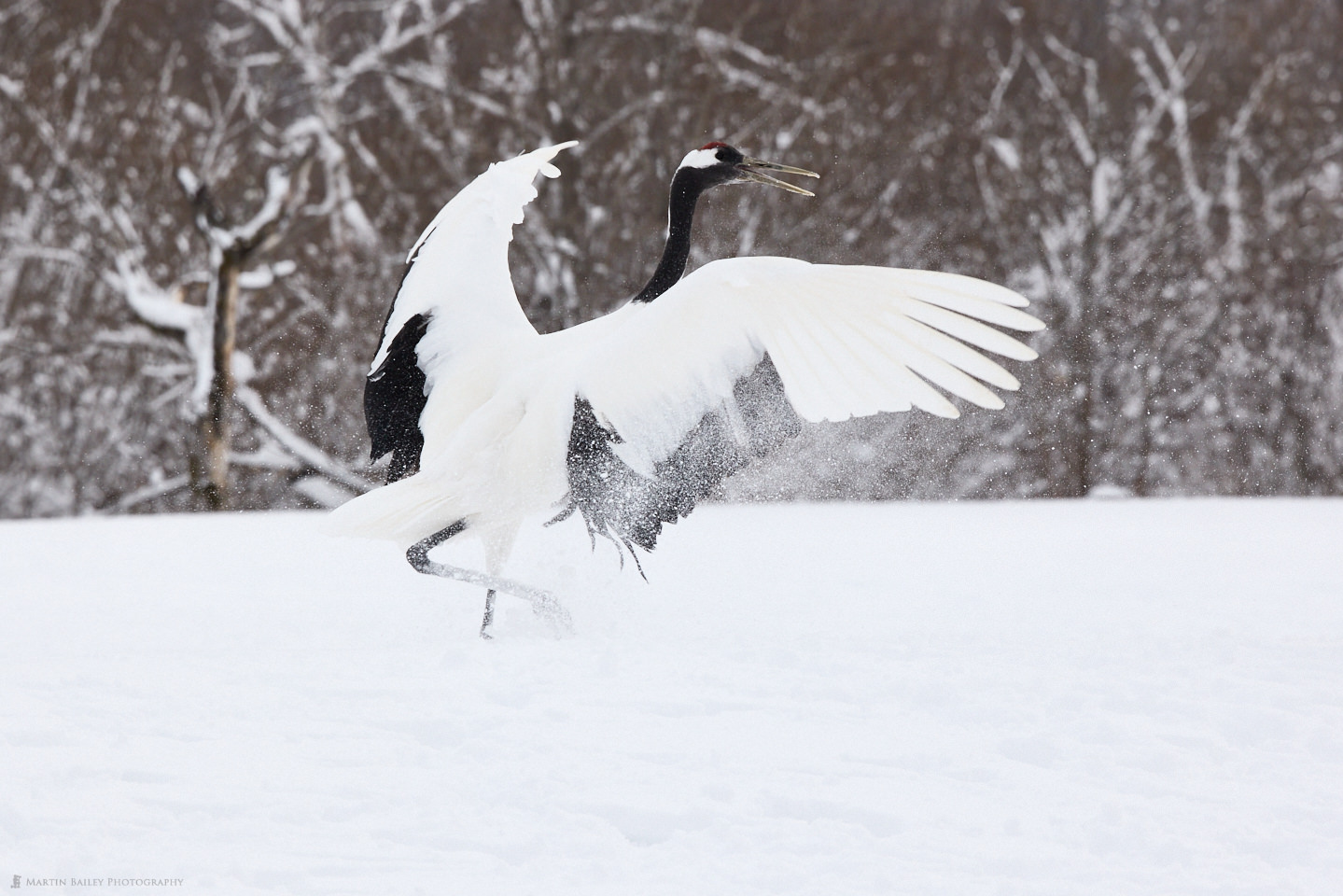
For most of these shots that I’ll share today, the exposure was around 1/1600 of a second, and I varied my aperture between around ƒ/10 and ƒ/14. In this case, I was using ƒ/14 because I was set up to capture two cranes in the scene together, which requires a deeper depth of field to get them both sharp. I could have opened up the aperture for this, as there is only one bird in the shot, but I prefer to prepare for multiple subjects at this location because I prioritize those shots over images of single cranes.
Case in point with this next image, where a crane was showing off his huge wings to his partner as they danced. I was focused on the crane in the background, and even at ƒ/14, the crane in the foreground is very slightly out of focus. Although it’s still acceptably sharp, it’s definitely borderline.
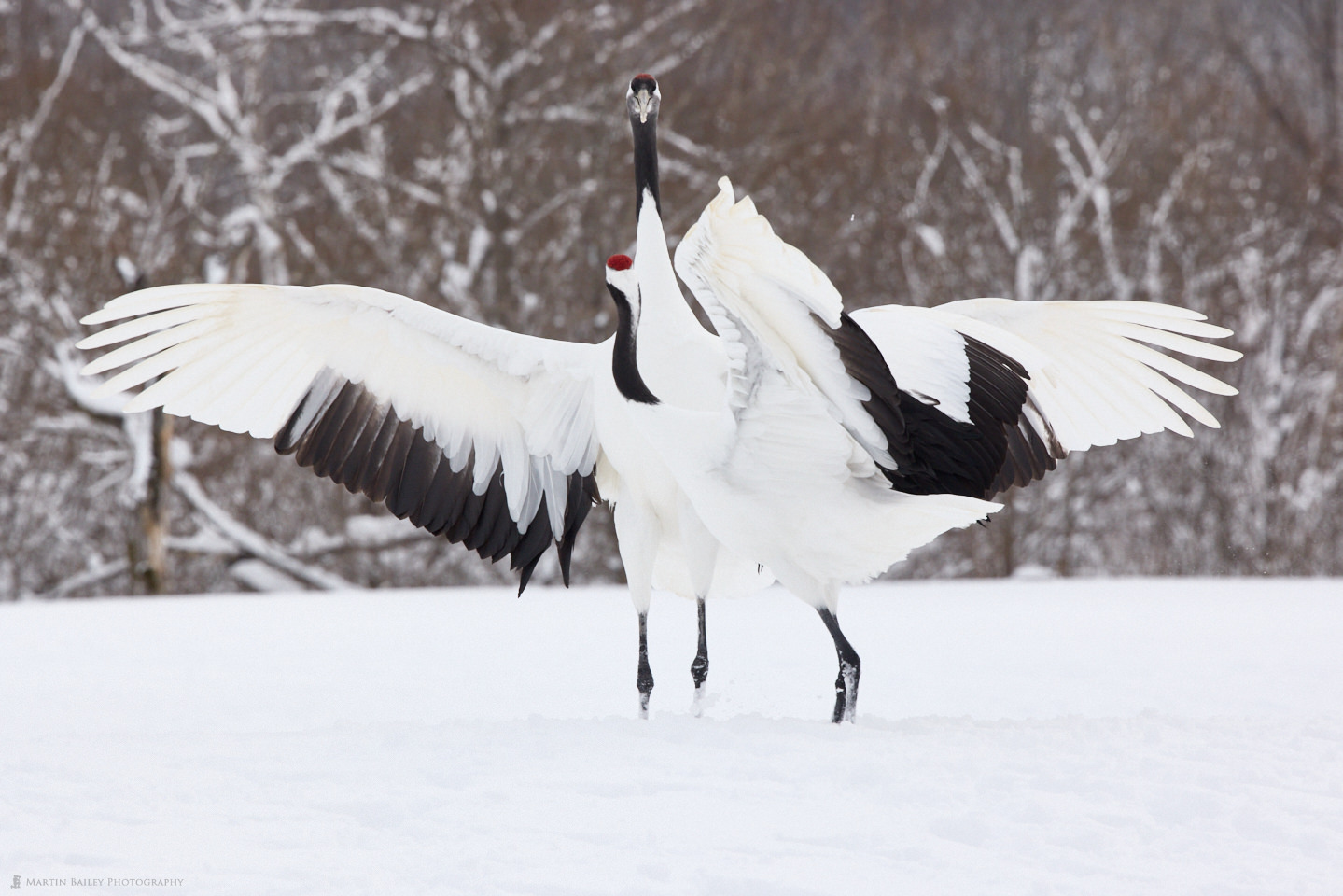
I took advantage of the fact that the birds in this next photo were both below the line between the snow and the trees and extended the out-of-focus snow at the top of the frame to cover the background trees. I love the white-on-white look with these beautiful black and white birds, so this was an easy way to achieve that without them being closer and only surrounded by snow in real life.
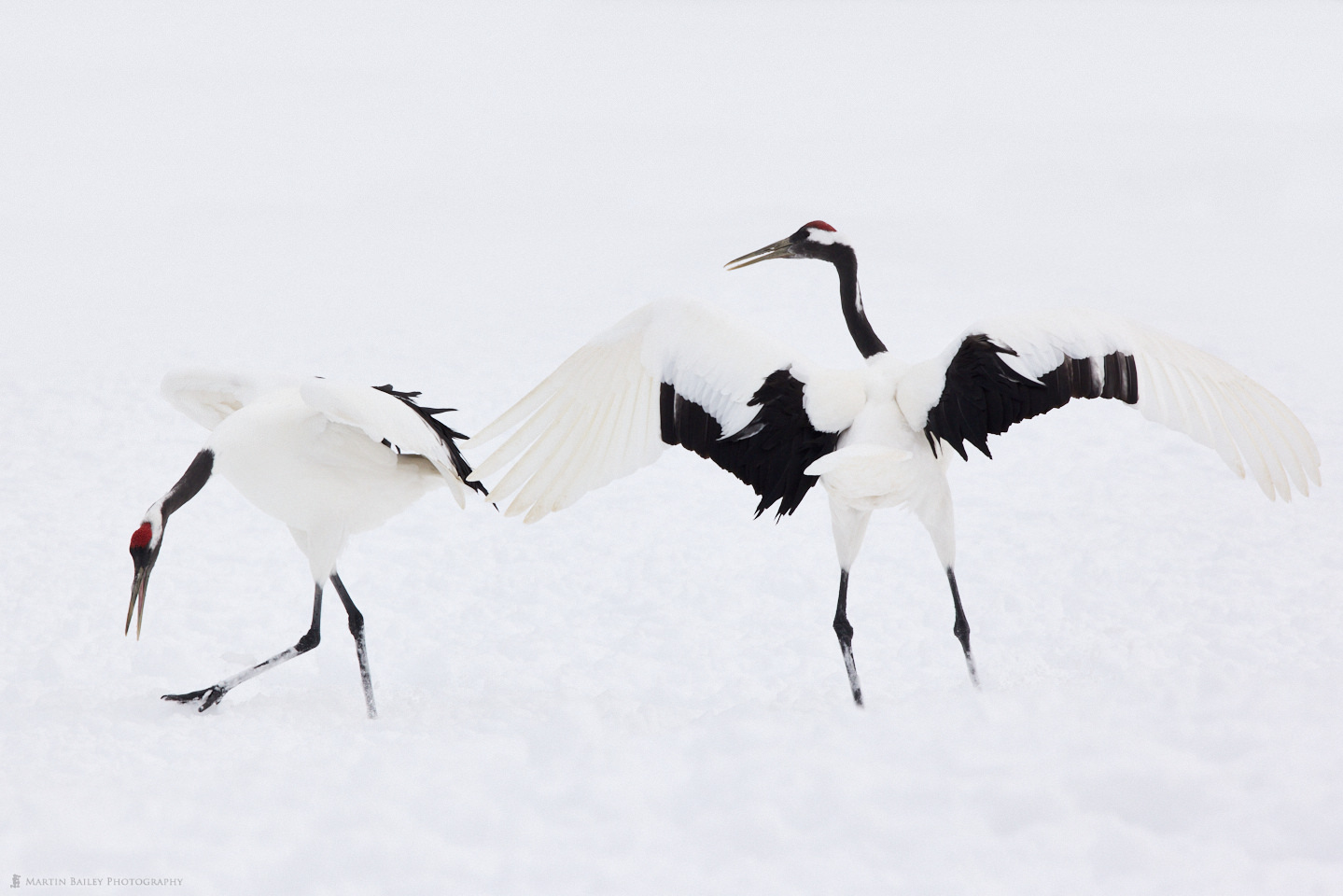
After a great second day with the cranes, we went on to a location where we can photograph the cranes flying to their roosting place in the river, and as the light fades, it’s a great opportunity to do some panning shots with these beautiful birds. Here is one of my favorite panning shots from this session, as the bird flew over a dark patch of trees with snow on some of the branches to create a mottled background.
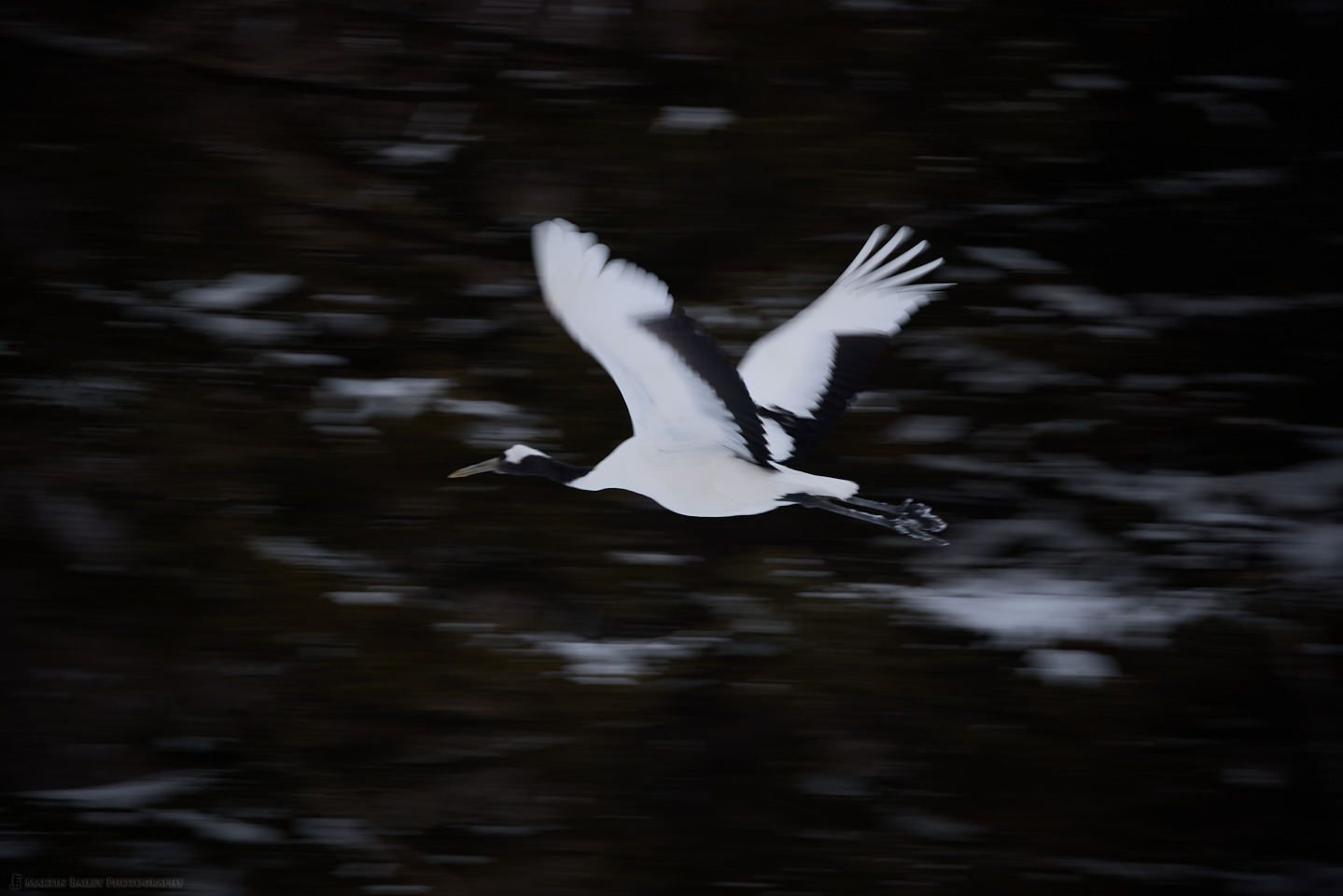
I added a bit of a darkened circular vignette to this image to deemphasize the flecks of white in the background, as I feel it looks better with them toned down a little. My shutter speed was a 1/50 of a second to allow the movement of the crane’s wings to register, along with the flowing background. My ISO was 320, and my aperture was at ƒ/14 again, as this time, I was trying to get a longer shutter speed rather than being concerned with depth of field.
The following day, we moved on to Lake Kussharo, where we’d spend a further two days photographing the Whooper Swans. The highlight of these two days is getting a chance to do some panning with the swans as the light drops at the end of the day. I continued to get lots of shots of single swans close up, but I also enjoyed getting multiple swans in the frame this year more than before. Here is an example where the foreground swan is nice and sharp, and the three additional swans in the back completely blurred.

Here also is a group of four swans, but this time they are still running along the water in a line as they passed by. Again, for these large birds, I was using a 1/50 of a second shutter speed for these shots, as that is enough to blur the winds and create some beautiful textures in the water and ice in the background as I move the camera with the birds.
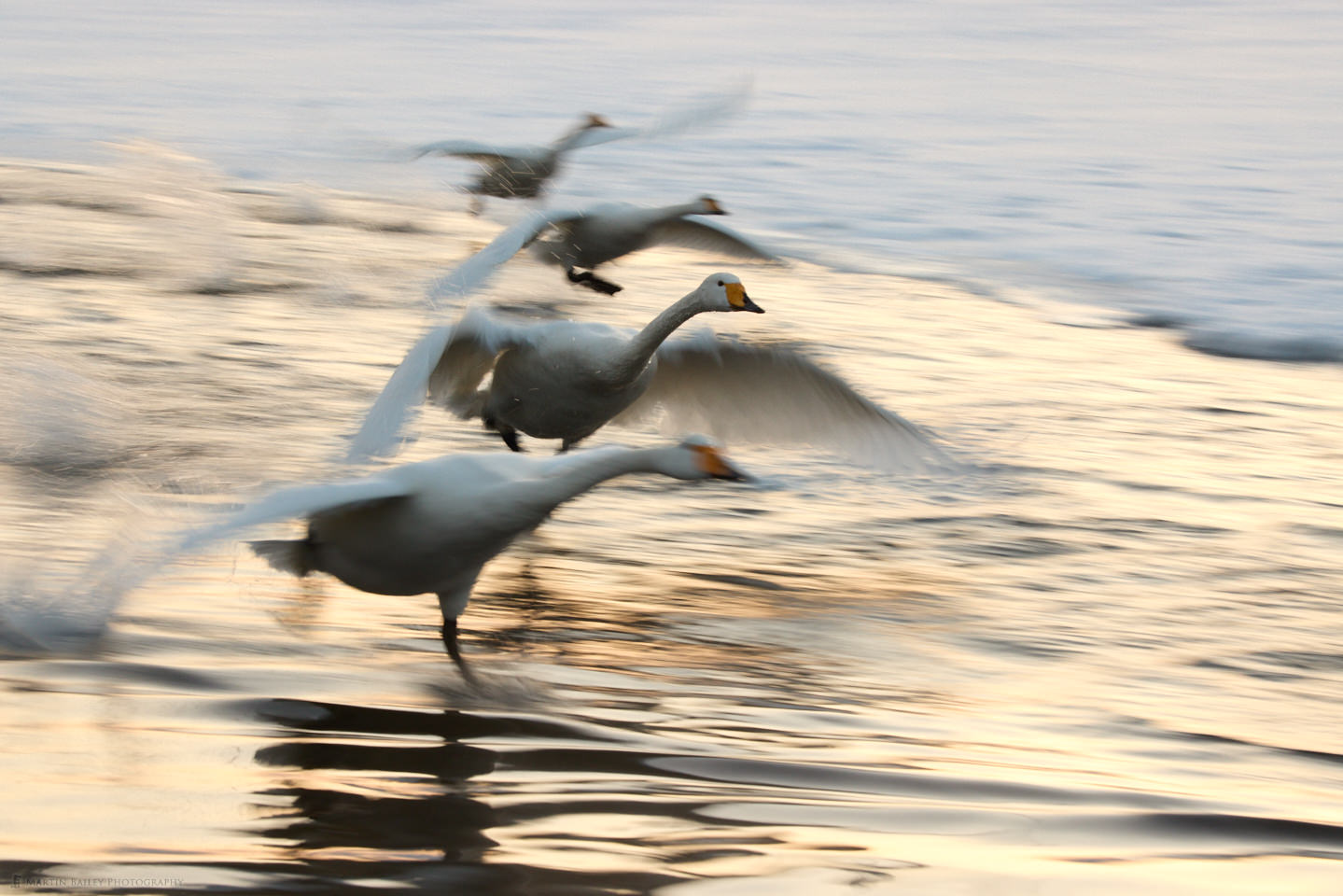
As you can see, once again, only one of the swans has a sharp head. Their heads move as they fly, so the success ratio for this kind of shot is low. The chances of getting more than one of them with sharp heads are even lower.
The following morning, we had a mist bank over the lake leading out from the edge of the trees in the distance, which added a lovely additional element to this photograph of two Whooper Swans flying in. I like how the first of the two swans is looking down, almost as though he’s deciding where on the ice would be a good place to land.

More panning shots at the end of our second day with the swans bought a stroke of luck, as I got three out of four swans’ heads sharp in this vertical group. Here an aperture of ƒ/16 not only helped me to get a long shutter speed for the panning effect, but it was definitely a help in getting all of these swans heads sharp at the varying distances.
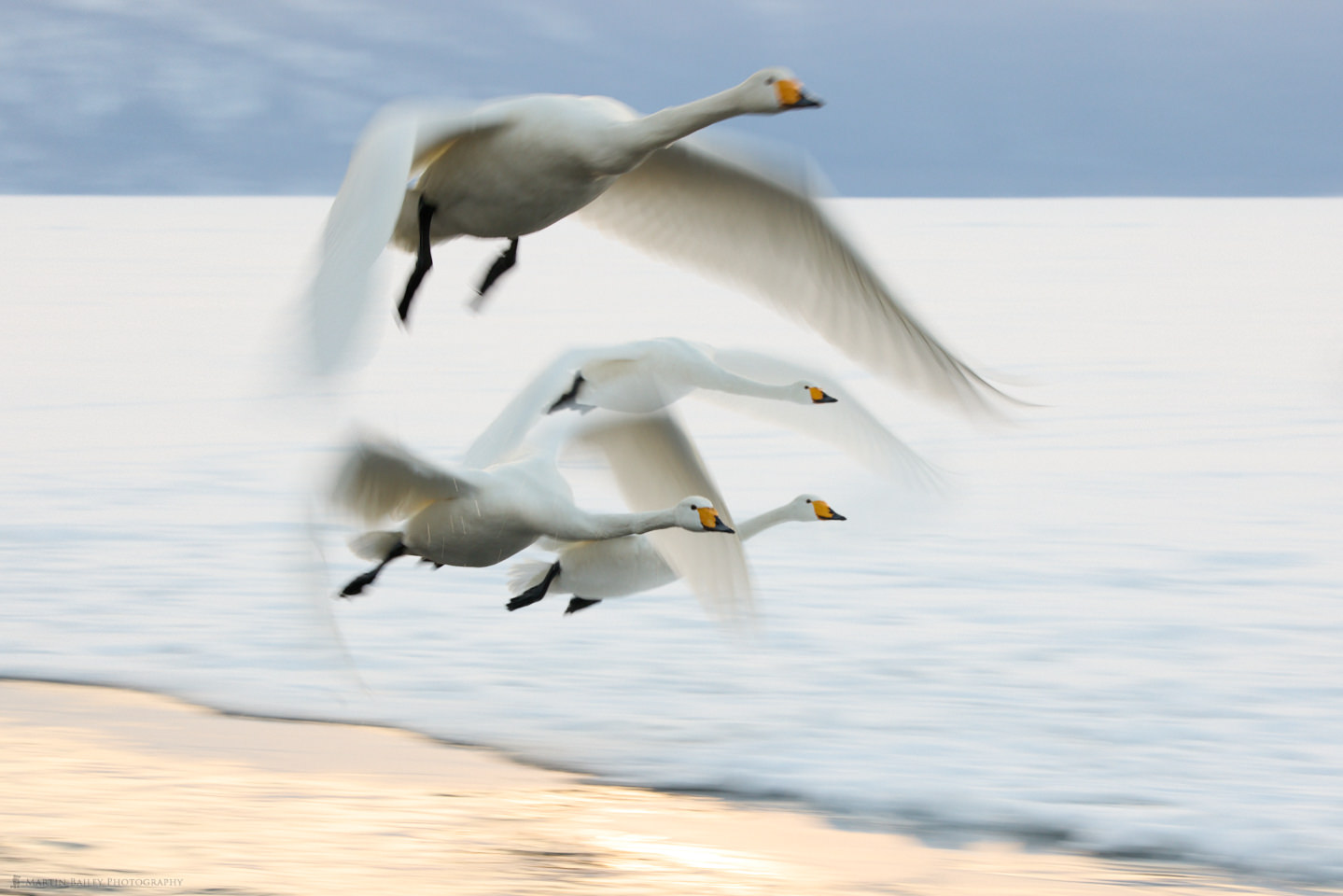
Let’s look at one last panning shot, although I have so many from this second day I could keep going for another twenty or more. This is a single bird, but I caught it as the swan waterskied to a halt as it started to pass by where I was kneeling with my camera.
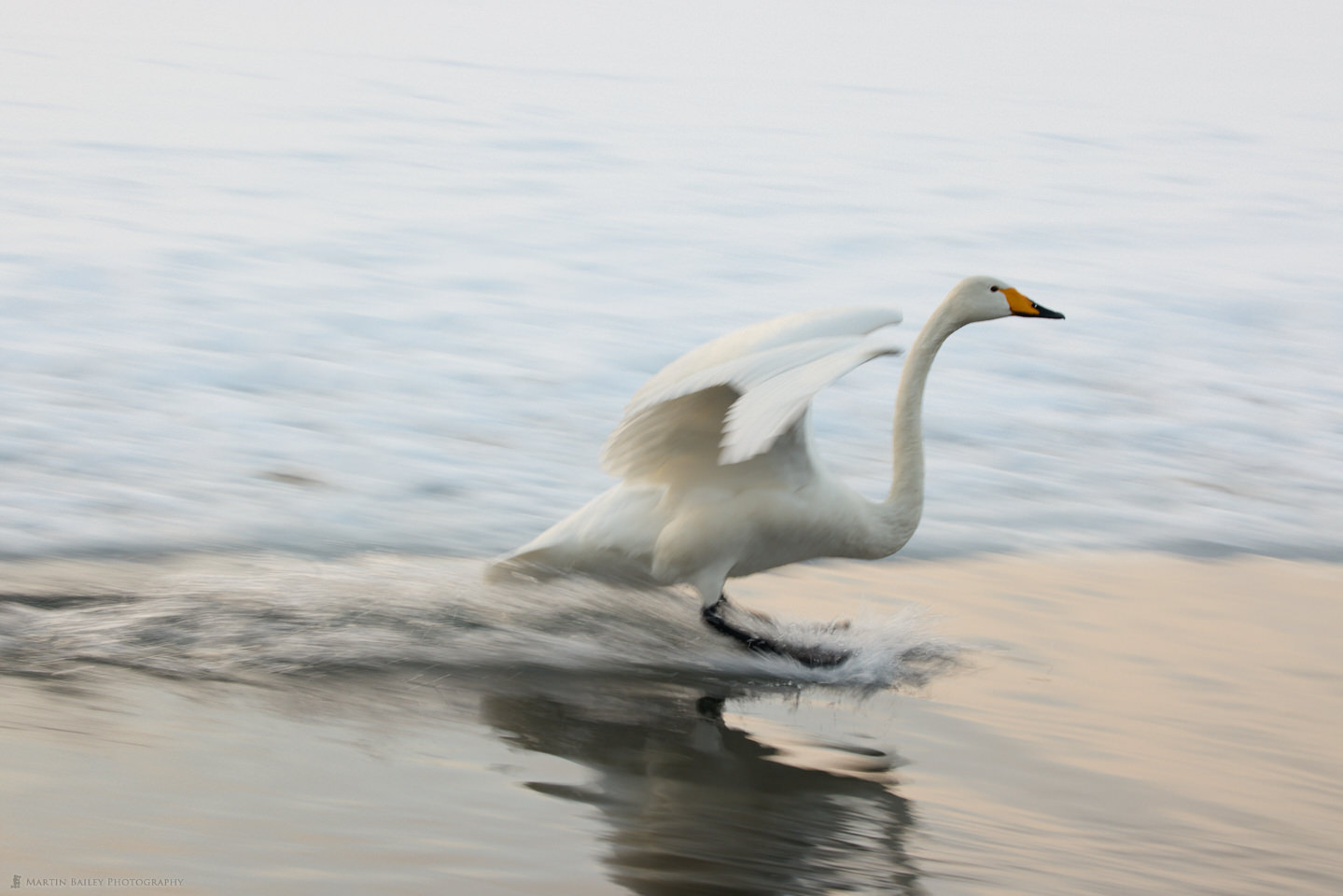
Like last week, I’ve gone through these images relatively quickly, and I can concentrate on the Sea Eagles in the final episode of this series if we finish the swans today, so let’s look at three more images bringing our total today to twelve images. On our second morning at the lake, we had a bit of mist again, but the fly-ins were like nothing I’d seen at this location.
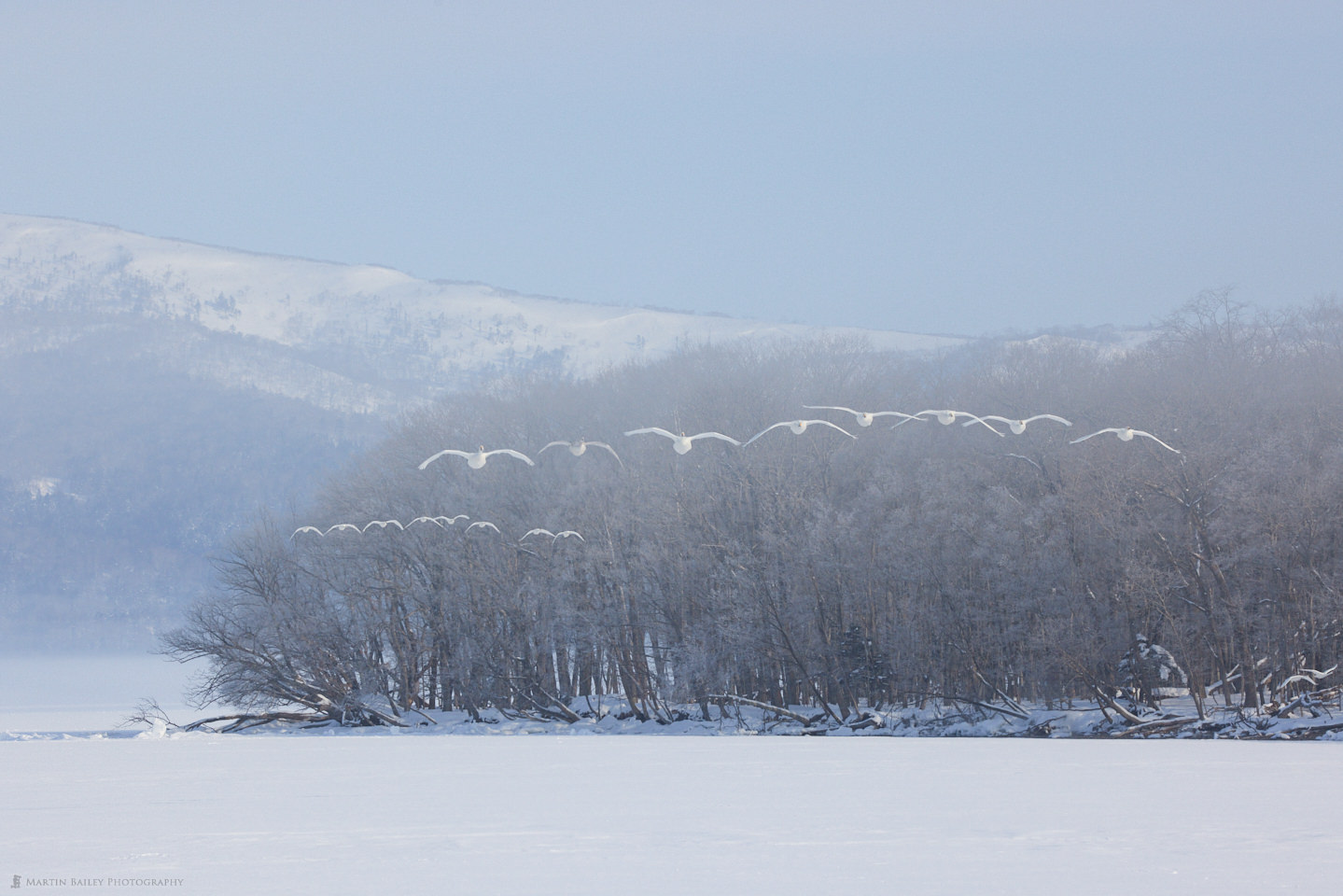
In this shot, we can see two separate lines of eight Whooper Swans as both groups flew toward the beach where we were standing. I waited until the swans in the second group were all over the trees, making them stand out more, before capturing this image, which is probably one of my favorites from the trip.
It’s actually really difficult to decide which photos to finish with, as I have so many that I love, but here is one of eight swans flying over the distant rim of the caldera lake. You won’t be able to see this in the web version, but as the mountains sharpen up as they leave the mist along the bottom of the frame, you can see all of the individual white trees, which are covered with hoar frost from the mist and morning cold.
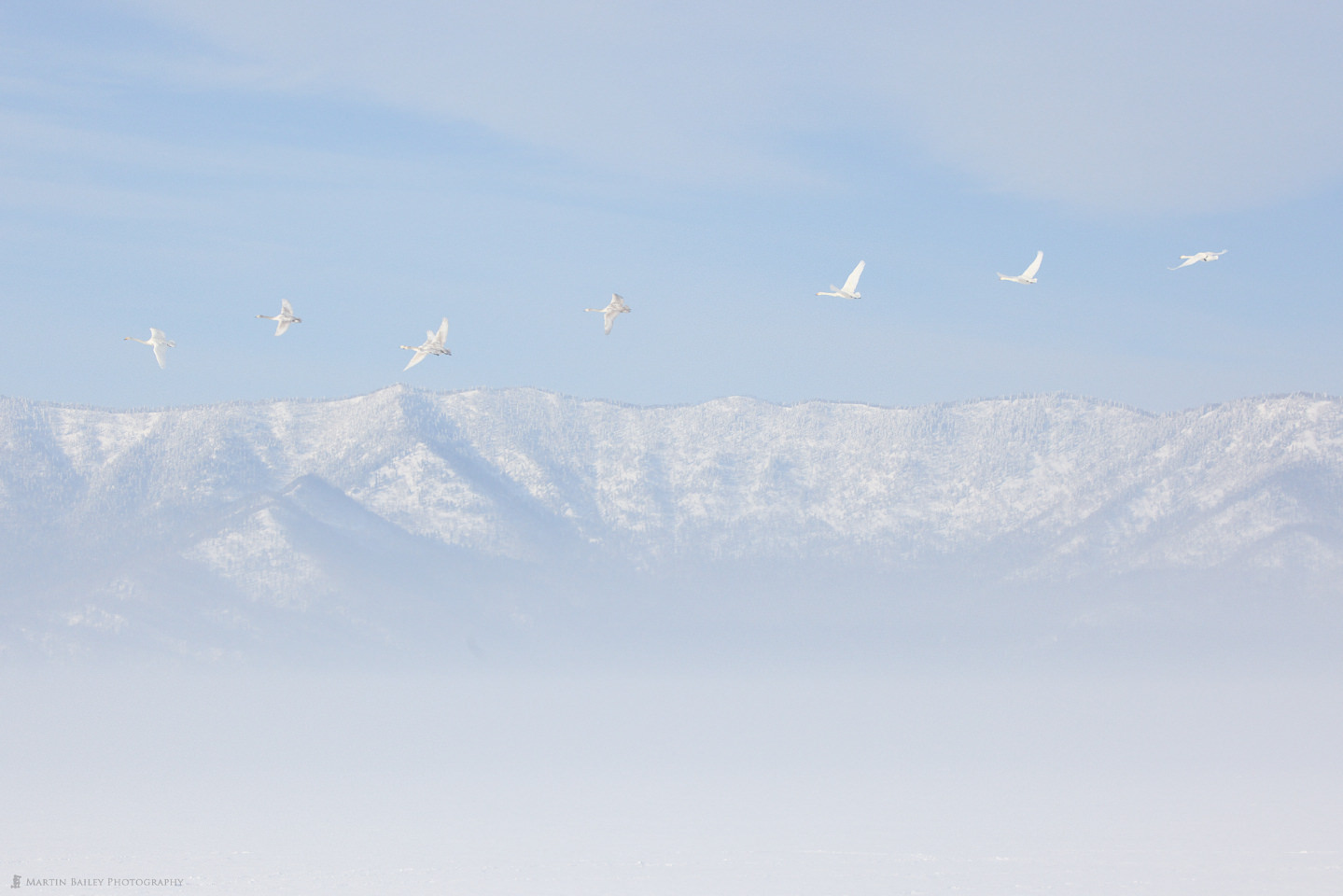
This would make a great print, maybe even cropped down to a panorama, so I’ve loaded it onto my wall art website with several other shots from this shoot. If you are interested, check out the Martin Bailey Art website.
One last image that I wanted to share from Kussharo Lake is one of two Whooper Swans with their wings open and honking together. This is something they do a lot just after they land, and it seems to be partly celebrating a safe landing and partly announcing their arrival to the group already at the location. Remember that you can see the shooting information for all images embedded in my posts by clicking on the image to open them up in the Lightbox. The shooting details will appear below the image for you to check out.
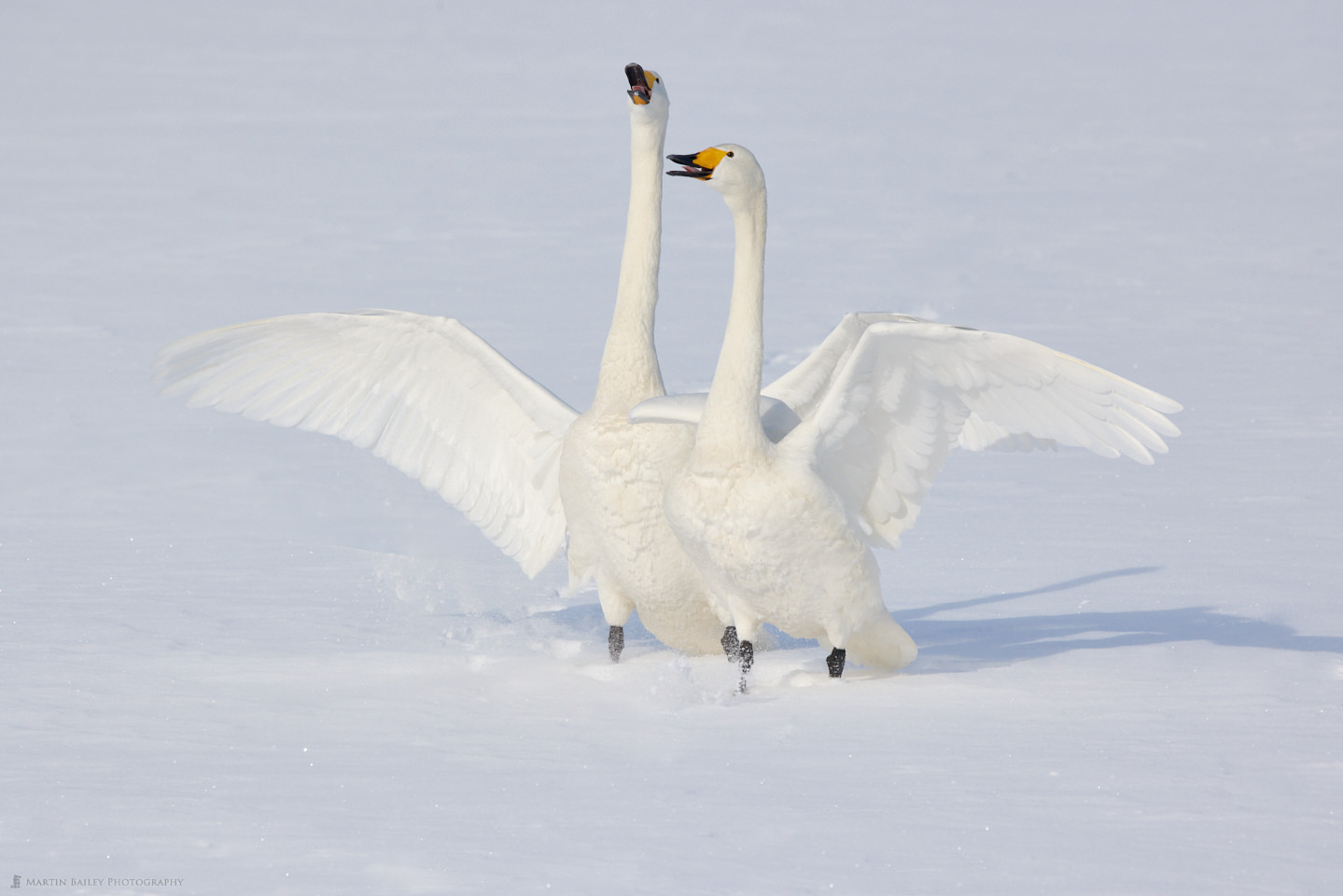
OK, so we’ll wrap it up there for today. I hope you’ve enjoyed this second episode of my final Japan Winter workshop travelogue series, which we’ll conclude in part three, which I’ll release next week. If you are considering joining us on a future tour, please check out our Tours & Workshops page or sign up for our newsletters to be alerted when something new is posted.
Show Notes
Check out future Tours & Workshops here: https://mbp.ac/tours
Visit the Martin Bailey Art website: https://www.martinbailey.art/
I added some images from this trip to the Japan Wildlife gallery here: https://www.martinbailey.art/japan-wildlife-with-snow-monkeys
Subscribe in iTunes to get Podcasts delivered automatically to your computer.
Download this Podcast as an MP3 with Chapters.
Visit this page for help on how to view the images in MP3 files.


0 Comments